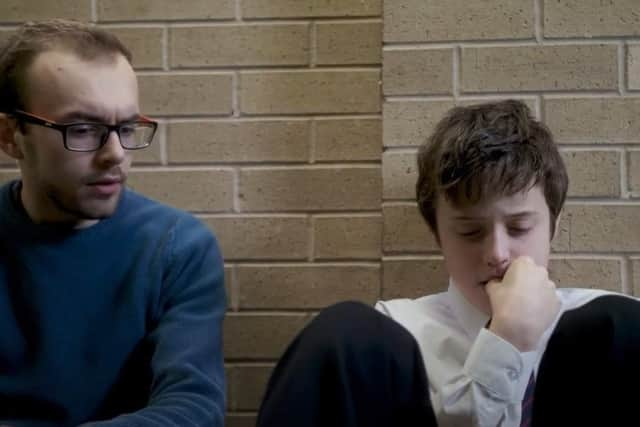Children's charity comments on school toilet policy after Morecambe mum raises concerns over locked loos during lessons
and live on Freeview channel 276
Kerry Harney’s 13-year-old daughter attends Bay Leadership Academy – formerly Heysham High School in Heysham – which, she claims, is taking basic human rights away from pupils by locking the toilets at some times of the day.
But the school has defended the approach and says it "respects pupils’ dignity and wellbeing", and there is a procedure for pupils who need to visit the loo during lessons.
Advertisement
Hide AdAdvertisement
Hide Ad

ERIC The Children's Bowel & Bladder Charity is the UK’s leading charity supporting all children and teenagers with a bowel or bladder problem, and is keen to raise awareness of the importance of allowing young people unrestricted access to the toilet.
Bowel and bladder issues such as daytime bladder problems, bedwetting, constipation and soiling can have a devastating impact on a child’s learning, development and well-being, says the charity.
ERIC said: “For many sufferers their continence problem will be 'chronic' – meaning it could persist for many years or keep recurring. It's an issue that will therefore commonly affect not just younger children, but also teenagers.
“A lack of awareness amongst health and education professionals, along with the stigma that still surrounds wee and poo is affecting many children and teenagers' school experience. These children are at high risk of bullying and withdrawing from social situations.”
Advertisement
Hide AdAdvertisement
Hide AdHere ERIC answers some key questions on school toilet policy.
Can schools lock toilets?
Many schools around the UK have a policy of locking school toilets during lesson times, with some even keeping them shut during breaks between classes. In schools where the toilets are locked, pupils sometimes have to request a key before they can use them.
Unfortunately, there's no law stopping schools from locking toilets during lessons, but that doesn't mean they should do it. Banning toilet breaks shows a lack of understanding of pupils' health needs and a lack of respect for children.
For a child with urgency problems, this is not a feasible solution.
Advertisement
Hide AdAdvertisement
Hide AdThis policy also singles out pupils with bowel and bladder conditions – when they may want to keep their condition private – as they are the only pupils allowed to use the toilet during lessons.
Health risks
Banning toilet breaks during lessons or restricting access to the toilets can aggravate or even create continence problems.
Consequences can include:
Soiling and wetting accidents in the classroom
Urinary tract infections
Withholding which can lead to constipation
Children reducing the amount they either eat or drink in the mistaken belief that this will stop them needing to use the toilet
Dehydration and lack of concentration which affects their school work
General anxiety around using the toilet outside of the home
Advertisement
Hide AdAdvertisement
Hide AdWhat can your child do if their school locks the toilets?
Request a meeting with your teachers so they can tell them the reasons why not being allowed to go isn’t good for anyone. Explain the effect it can have on children's health and ability to concentrate in class. Let them know it’s important for children who’ve got an invisible bowel or bladder problem and may feel too nervous to ask for a toilet pass.
Explain to school that bladders and bowels work to their own timetable and not the school’s. It’s not a rule that we ask grown ups to stick to when they’re at work so why should children be treated differently?
Encourage pupils at the school to sign a pledge not to abuse their right to go to the toilet during lessons and promise to keep the toilets clean and tidy. Make the toilets a place that everyone needs to value and respect. Try to get into the habit of using the toilet at break and lunch time.
Ask if the school has a toilet policy (all schools should do), suggest that the views of pupils are included in the policy and make sure everyone sticks to it. ERIC has a School Toilet Charter which your child could ask their school to adopt. All teachers should then know what the policy says so everyone follows the same rules.
Advertisement
Hide AdAdvertisement
Hide AdTalk to the school council, they can raise the issue with the school governing body.
Set up a petition to get the school to reverse the policy and get backing from students and parents. Find out from friends what’s stopping them from going to the toilet at break or lunch time. Are there enough toilets for everyone to use? Have students got enough time to go during breaks?
How do you get a toilet pass at school?
Since the passing of the Children and Families Act in 2014, education settings have a statutory duty to support children with health conditions, including bowel and bladder problems.
If a pupil has an identified continence issue that the school is aware of, they should be given a 'toilet card' or similar that allows them to go to the toilet when they need to.
Advertisement
Hide AdAdvertisement
Hide AdThe school may ask for a signed letter from a health professional requesting that a child has a condition which means they need a 'toilet pass'.
*For further information and advice on school toilet policy, go to https://eric.org.uk/information/school-toilet-policy/
